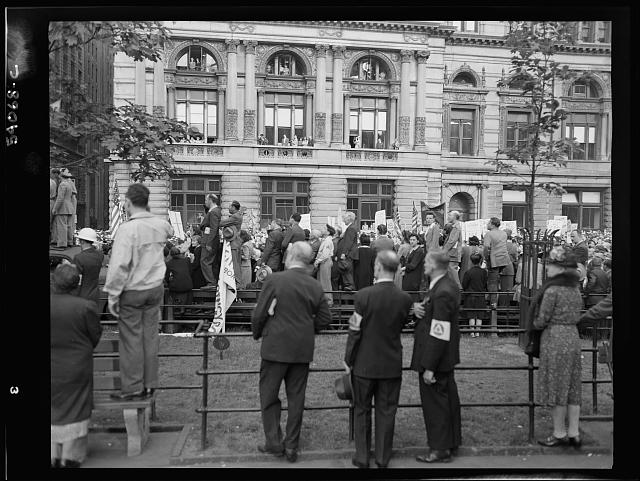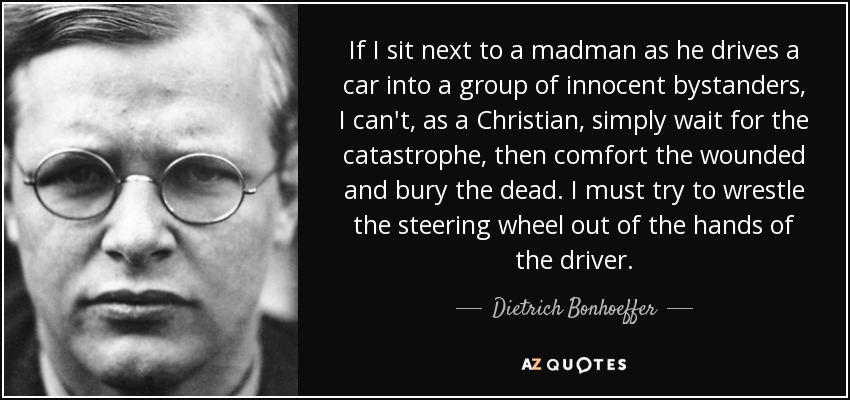The announcement came from a transatlantic radio-telephone hookup from Supreme Headquarters to all major press services and broadcasting networks in the U.S.
A dramatic 10-second pause preceded it. Colonel R. Ernest Dupuy, General Eisenhower’s public relations officer spoke:
“This is Supreme Headquarters, Allied Expeditionary Force. The text of Communique No. 1 will be released to the press and radio of the United Nations in ten seconds.”
The seconds were counted off… “One, two, three…:”
“Under the command of General Eisenhower,” Dupuy read slowly, “Allied naval forces, supported by strong air forces, began landing Allied armies this morning on the northern coast of France…”
The home front was officially notified.
Calm prevailed in Times Square. News of the Allied Invasion was met with quiet trepidation. There were few people on the streets; most of them servicemen.
At 4 a.m., about two dozen people gathered at a newsreel theater to hear news updates broadcast over loudspeakers.
Across the city, lights began streaming through windows in the pre-dawn mist. A telephone call or a knock at the door alerted neighbors to gather around their radios.
Mayor LaGuardia was informed of the far-off invasion by New York policemen. He called upon the people of New York to carry on about their business; to give our military the “utmost support.” Later, he announced plans for a mass prayer meeting at 5:30 p.m. at Madison Square Garden where the Eternal Light burned. Churches announced they would remain open for prayer the entire day.
The New York Stock Exchange suspended trading and held two minutes of silence at 11 a.m. as a “tribute to the armed forces in the liberation of Europe.”
Three words were repeated again and again across America: “This is it.” A feeling of intense anxiety mingled with a strange sense of relief as news broke that the much talked about invasion had finally begun.
The extremely rare ringing of the Liberty Bell was heard across the country on national radio as Philadelphia Mayor Barnard Samuel tapped it with a rubber mallet and proclaimed, “Let it proclaim liberty throughout the land, and the return of liberty throughout the world.”
In the larger cities, people flocked to cathedrals and synagogues. Across rural farmlands, they stopped what they were doing and headed to steepled white churches.
In San Francisco, Bay area shipyard workers reporting for the graveyard shift, jammed the yards’ switchboards with inquiries as to whether the rumors were true. Officials in charge immediately began broadcasting updates over the yard’s PA system. Workers were jubilant.
Street crowds in Oakland and San Francisco were more somber and tense; yet in the late night movie theaters, special announcements of the invasion were greeted with boisterous applause. In Oakland, hotel guests, instead of waking to the telephone operator’s standard, “Good Morning,” heard instead, “Good morning, this is D-Day. The Allies have invaded France.”
In Los Angeles, aircraft and shipyard workers strained to hear the news on the loudspeakers over the whir of machinery. The news was met solemnly, and workers returned to work quietly, but with extra zeal.
In Santa Monica, home of the Douglas Aircraft Company where many of the air transports that carried parachute assault troops had been manufactured, a bugle call was sounded. Workers worked faster.
In Pearl Harbor, Hawaii’s KGMB broadcast the news on their 10:00 p.m. broadcast. Sailors and Marines, still reeling from the West Loch disaster, cheered the news and yelled to each other, “Hey you guys, it’s started!”
In Dallas, as sirens signaled news of the invasion, a baby girl was born and named, “Invasia Mae” in honor of the simultaneous event. A minister, a rabbi and a priest led prayer over the early morning radio broadcasts, and Governor Coke Stevenson announced it was a “solemn hour for Texans everywhere…”
The Governor of Illinois, Dwight Green, released a statement saying in part:
The minds and hearts of all Americans are with our men at this trying time; hoping that with the grace of the Almighty the invasion will speedily succeed without great loss of life, and bring about a just and lasting peace.
But the invasion did not happen speedily, and it was not without great loss of life. Americans were already making great sacrifices and mourning their dead, but they were about to be sent reeling with news of corpse strewn beaches a world away.
As more than 700 WWII veterans die each day, it’s likely this will be the last time many will get to mark this anniversary; the last time their story will be heard.
Not only are we losing these courageous souls, we are losing the rest of a generation whose lives were forever changed as they toiled away on the home front. We are losing the people who can give firsthand accounts of what it was like to live through those times. People who remember a nation that worried together, wept together and prayed together. People who carried on the work of a nation when everything they loved lay mangled and dead on a beachhead in France.
(In remembrance of my uncle, Alvin H. Harris, 101st Airborne, D-Day invasion. Survived)
Originally published on American Thinker.



